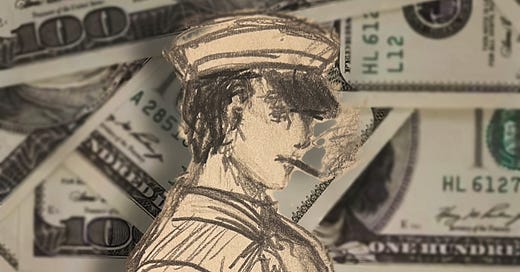What Americans Aren’t Being Told About the Conflict in Ukraine
An introductory glance at the events precipitating the Russian invasion.
Every day the spotlight of the world stage grows brighter as it shines on Ukrainian battlefields. Reports from the front lines compare the scenes with descriptions of the trenches of the First World War and the conquests of Napoleon, bringing to mind images of teenage Cossacks at the ready with French bayonets like the one my father kept in a display case when I was a kid.
As the situation in Ukraine continues to destroy infrastructure, end lives, and alter international relations, American media continues to spread a war-mongering narrative that keeps people conveniently in the dark. Unfortunately Americans are buying the story. Citizens have a right (as well as an obligation) to know how their tax dollars are being used, especially when such spending both goes against American values and risks their security.
The most pervasive misconception regarding the invasion of Ukraine is repeated by the media like a sacred mantra - a sort of meditative expression of their blood-soaked servitude:
Vladimir Putin the Bully maniacally decided to invade the sacred country of Ukraine purely out of the malevolence of his soul.
Americans love a moral dichotomy... GO TEAM! Unfortunately the reality of the situation is much more complex and a constructive conversation requires that we first outline some basic premises. The first being the idea that every nation has the right to protect their own sovereign interests. The other prerequisite is the sanctity of verbal agreements. Mutual trust is fundamental to civility and it’s deterioration creates questions that have no obvious answers: How valuable is an organization’s word and what consequences should be expected when that word is broken? NATO’s eastward expansion, beyond being entirely unnecessary for the achievement of any legitimate goal (hegemony being thus excluded) presents an undeniable threat to Russian security. The international community has understood this for decades. In 1990 the U.S. Secretary of State, James A. Baker, assured Gorbachev that NATO would not expand beyond the borders of Eastern Germany. Later that May this was repeated by NATO’s secretary general. NATO’s expansion and the disregard of it’s own word is viewed by Russia as an act of aggression, and of course it is. We need only remember the Cuban Missile Crisis to empathize with Eastern security concerns. NATO’s refusal to acknowledge this points to a pathological arrogance and entitlement that if left unchecked will almost certainly have dangerous consequences for the West.
NATO’s expansion is unfortunately not Russia’s only legitimate grievance. The Ukrainian territories of Donetsk and Lugansk have been victimized by Kiev for their pro-Russian views since 2014 when the U.S. government poured billions of dollars into a military coup, the details of which I plan to address in future articles.
In February 2022 the Donbas and Lugansk People’s Republics made an official announcement of civilian evacuations to Russia in response to months of intense shelling by Ukrainian forces. The government attacks on its own people wounded civilians and destroyed infrastructure as intended. While it is true that these areas are not located within official Russian borders the shelling can hardly be described as anything but an attack on a Russian people - they speak the Russian language and they practice the Russian orthodox religion. Vladimir Putin’s response is clear: Attacks on these civilians won’t be tolerated.
Treating an entire country the way a strict father treats an unruly child is hardly a path to diplomacy. This attitude is apparent even in the language which is full of terms historically reserved for school-children. Vladimir Putin isn’t a world leader guarding the security of a legitimate nation, he’s a bully. The mindset is as condescending as it is ineffective. Well, unless the goal was to proliferate the conflict into what may well be the next World War. Perhaps if Americans understood the historical events precipitating WW1, the idea that idealogical values could be effectively defended militarily would raise some eyebrows.
As things are however, the public seems to have little skepticism regarding the moral superiority of Ukraine and it’s Western allies. The cost of this complacency will one day be measured in blood. As primary financial sponsors of the conflict, the question to American citizens is this: Is the self-righteous indignation worth the human cost?
I’ll leave readers with that most critical question and the words of former President Richard Nixon, who perhaps contributed more than anyone to the resolution of the Cold War...
“Peace demands more, not less, from a people. Peace lacks the clarity of purpose in the cadence of war.... Our contact at home and abroad will determine how well we improvise beyond peace.”
-The Shultz Report by M. Shultz




